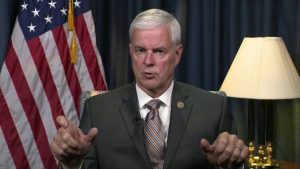
U.S. House Budget Committee Chairman Steve Womack (R-AR) is on a mission to ensure the federal government remains funded and operating with a newly sponsored bipartisan bill that would implement reforms to the budget and appropriations process in the U.S. House of Representatives.
“Clearly our budget process is broken,” said U.S. Rep. Womack, who on Nov. 29 introduced the Bipartisan Budget and Appropriations Process Reform Act of 2018, H.R. 7191, with original cosponsor House Budget Committee Ranking Member John Yarmuth (D-KY).
“While this legislation is not a silver bullet, it includes the proven bipartisan reforms developed by the Joint Select Committee and begins to takes steps necessary to improve the federal funding process,” said Rep. Womack.
H.R. 7191 essentially continues congressional consideration of a package of bipartisan recommendations that the Joint Select Committee on Budget and Appropriations Process Reform voted on last week, but failed to move out of committee, according to a statement released by Rep. Womack’s office.
“After a year of hard work, we had the wonderful opportunity to serve as an example to our colleagues and our country — the opportunity to prove that Washington can work together. We let them down,” said Womack, who is also co-chair of the Joint Select Budget Committee, following the Nov. 29 vote.
“Despite the fact that the reforms agreed to by the Joint Select Committee and included in our proposal were all adopted with a bipartisan, bicameral supermajority of our panel, we couldn’t get across the finish line,” he said. “I am extremely disappointed in our failure and in my colleagues who lacked the ‘political will’ we have preached is so needed in Washington to vote out this good, bipartisan proposal.”
Referring to the remaining days of the 115th session of Congress, Rep. Womack also said that the federal government could be partially shut down if lawmakers don’t make headway on a final funding agreement.
“The most important role given to Congress under the Constitution is the power of the purse, yet we regularly and repeatedly cede our responsibility to fulfill this essential duty. In fact, we are on the precipice of doing so again,” he said.
On Monday, House budget leaders said that legislation was filed to keep the government running until Dec. 21, an agreement that the U.S. Senate Appropriations Committee also confirmed, according to press reports.
Such an extension is needed in lieu of funeral services this week for former U.S. President George H.W. Bush, who died last weekend and on Wednesday will lie in state at the U.S. Capitol. The House will reconvene on Thursday.
Rep. Yarmuth said he’s proud to sponsor H.R. 7191 with Rep. Womack, which he said includes many of the bipartisan reforms the committee worked on collaboratively. “It does not replace the heavy-lifting we must do to address our nation’s long-term fiscal challenges, but I hope we can build on this effort to address the needs of the American people in the new Congress,” he said.
For instance, H.R. 7191 includes the Joint Select Committee’s bipartisan recommendations relevant to the House, such as biennial budget resolutions, which would require budget resolutions to cover at least two years, while maintaining annual appropriations, according to a summary provided by Rep. Womack.
Other committee recommendations included in H.R. 7191 are an annual reconciliation provision, a congressional budget completion date on or before May 1 of each odd-numbered year, and a requirement that an annual supplemental budget be submitted by the Executive Branch.
H.R. 7191 has been referred for consideration to both the House Budget Committee and the U.S. House Rules Committee.



